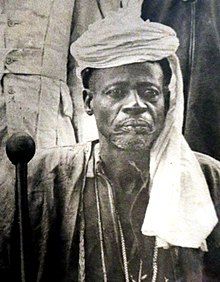The ability to mobilise to take advantage of an opportunity is the mark of every good leader.
Nabongo Mumia was crowned king of the Wanga Kingdom in 1882 after the death of his father. His was no ordinary reign, for these were no ordinary times. As with all other parts of the country, change was coming to this isolated region. It started with the coming of Arab traders from the Swahili coast. Soon enough, the white explorers arrived – and then they just kept coming … and staying.
Community leaders like Nabongo Mumia bore the responsibility of dealing with these new players on behalf of their people. While most saw this invasion as a major problem, Mumia saw an opportunity to strengthen his kingdom. Simply by being a little smart, Mumia turned an insurmountable challenge into a gigantic opportunity.
Thanks to Mumia’s leadership, the Wanga Kingdom went through colonialism mostly unscathed. While other communities were losing territory, Mumia was expanding his kingdom. But his contributions went further than that. It ensured the continuity of the Wanga monarchy – the only pre-colonial government surviving in Kenya today.
So what leadership lessons can we learn from Nabongo Mumia?
Catch the opportunity
The ability to mobilize to take advantage of an opportunity is the mark of every good leader. Leaders must be able to recognize an opportunity and be willing to do what needs to be done to take advantage. First off, Nabongo Mumia allowed free trade with Arab and Swahili traders from the coast. The opportunity to boost trade with their exciting new products was too good to pass up. Trading with all – his native neighbours and newcomers – made the Nabongo a rich and influential man.
The real mettle of a leader is tested when his/her territory is threatened. The coming of the white man was one such test. Unlike the Arab traders, the British were here for territory. After navigating threats from the Arabs, the Swahili, and neighbouring Baluchi, Luo, and Nandi for years, Nabongo was coming up against a foe whose like had never been seen in the territory before.
Nabongo Mumia not only neutralized this challenge, but he found a way to turn it around. He found a way to make it a profitable interaction for the Wanga.
Strategic partnerships
Sometimes even the best leaders are not good enough to deal with a problem alone. This is where strategic collaboration comes in. By making an enemy a better deal than he expected, you win without ever having lifted a finger.
Nabongo Mumia was a strategic leader. He recognized the might of the British and feared their appetite for land. At the same time, he was trying to survive constant attacks from his neighbours. If he was going to survive the incursion, he would have to be smart.
He resorted to the oldest play in the book – play your enemies against each other. By getting into a strategic partnership with the British, he used their power and might to defeat his local enemies.
Vision
A good vision is what sets a successful leader from the rest. It helps one to navigate difficulties and respond to threats appropriately. Nabongo Mumia’s vision was to expand his kingdom. He would not let even the coming of the white man stop him just because everyone was losing land.
A well-executed vision establishes the legacy of a good leader. In the case of Nabongo Mumia, the vision was achieved through thick and thin.
Boldness
A bold leader does what needs to be done regardless of what others think. Nabongo Mumia was a bold decision-maker. From conscripting the Swahili and Arabs as mercenaries in his army to welcoming the white man, his actions were liable to draw hysteria. And yet without them, the Wanga kingdom would not be in existence today. Boldness pays off.
Intelligence
For a leader, intelligence is not just about possessing great wit or having the requisite information. It is also a matter of profitably applying the knowledge you glean. Nabongo Mumia was an intelligent ruler. He learned about the disruptive nature of the coming of the white men early, so he used this knowledge to position himself as a willing collaborator.
Loyalty to subjects
Not many leaders appreciate the responsibility they have towards their subjects. Yet there could hardly be a more important quality, for subjects make the leader. Nabongo Mumia was a well-loved leader of the Wanga, with whom he was reportedly generous, fair, pleasant, and jovial.
A good relationship with subjects gives a leader the peace of mind they need to accomplish their goals without fearing an insurrection. Even after Mumia was stripped of many of his powers, he continued to be the Nabongo till his death. His line has continued ruling to this day as well, thanks in large part to the goodwill he accumulated with his people.
Even though he was a collaborator, Nabongo Mumia possessed many good leadership qualities. Through bold action, he protected his subjects from the harms of the onset of colonialism and secured his kingdom. Like any good entrepreneur, Nabongo Mumia spotted the opportunity in a threat and pursued it. Sometimes that is all you need do.





